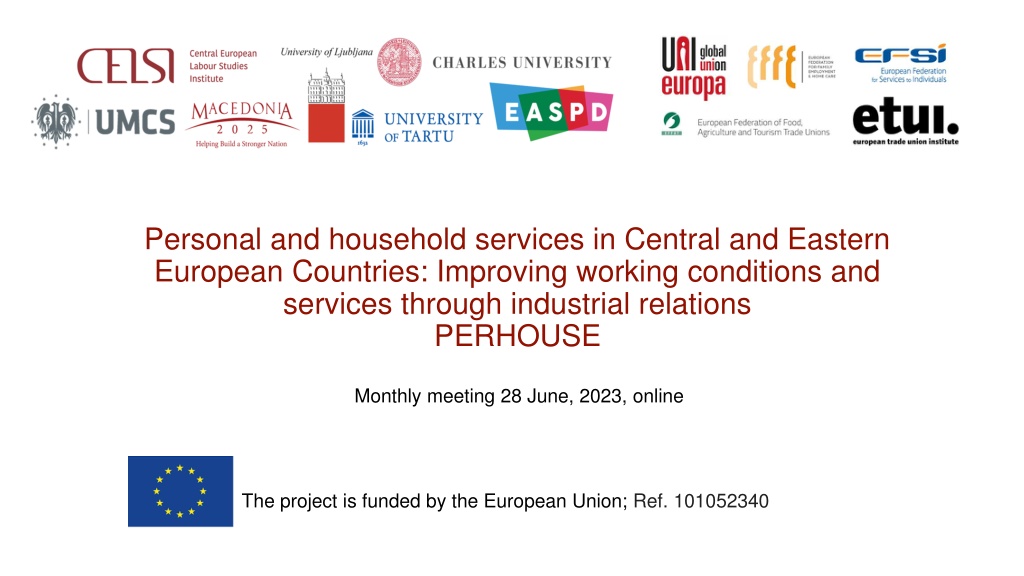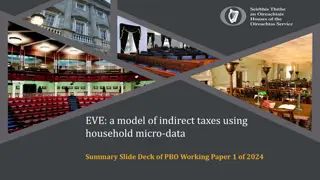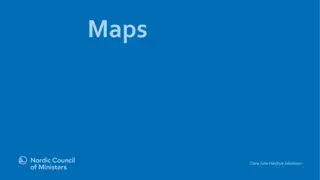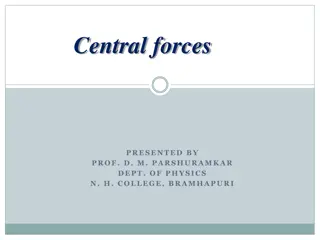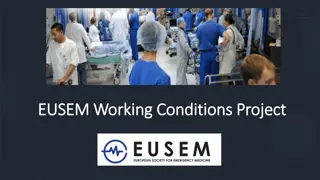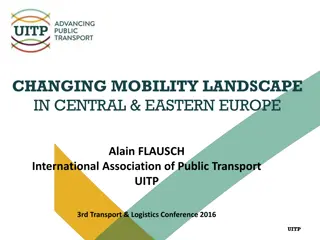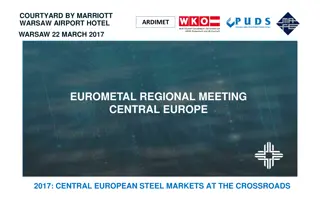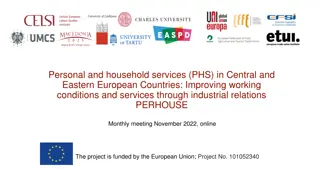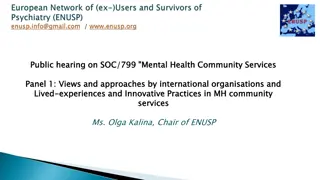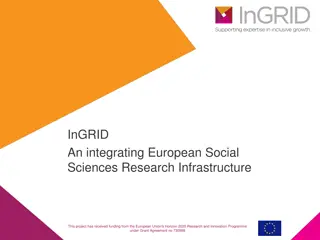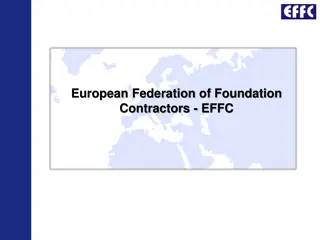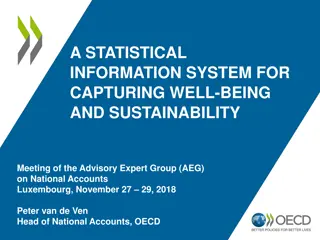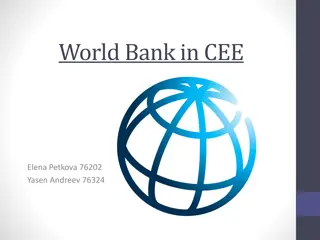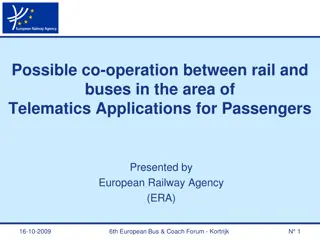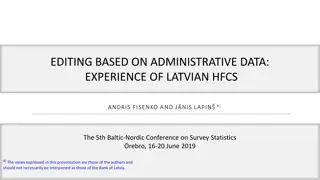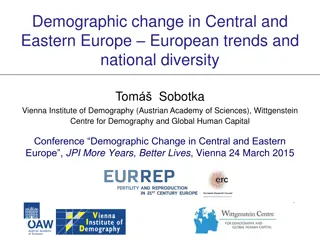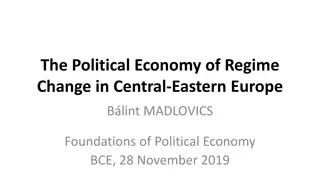Enhancing Personal and Household Services in Central and Eastern European Countries through Improved Working Conditions and Services
Explore the initiatives undertaken to enhance personal and household services in Central and Eastern European countries, focusing on improving working conditions and services through industrial relations. The project, funded by the European Union, aims to address challenges and implement solutions for better service provisions. Key topics discussed include survey findings, responses on service purchases, types of services availed, demographics of respondents, and living locations.
Download Presentation

Please find below an Image/Link to download the presentation.
The content on the website is provided AS IS for your information and personal use only. It may not be sold, licensed, or shared on other websites without obtaining consent from the author. Download presentation by click this link. If you encounter any issues during the download, it is possible that the publisher has removed the file from their server.
E N D
Presentation Transcript
Personal and household services in Central and Eastern European Countries: Improving working conditions and services through industrial relations PERHOUSE Monthly meeting 28 June, 2023, online The project is funded by the European Union; Ref. 101052340
Agenda Reporting (Sona Mikul kov , CELSI) State of art - surveys (discussion, troubleshooting) State of art - interviews (discussion and troubleshooting) D2.1. and D2.2. - next steps AOB PERHOUSE, Monthly meeting JUNE 2023
Demand survey number of responses ANSWER CHOICES RESPONSES Bulgaria 1.02% 3 Croatia 1.70% 5 Czechia 3.40% 10 Estonia 14.29% 42 Hungary 5.78% 17 Latvia 1.36% 4 Lithuania 0% 0 North Macedonia 22.11% 65 Poland 17.69% 52 Romania 5.10% 15 Slovakia 14.97% 44 Slovenia 10.54% 31 Other 2.04% 6 TOTAL 294 PERHOUSE, Monthly meeting JUNE 2023
Demand survey few preliminary results 1g. Please sum up if you did or did not purchase any personal or household services in the last 5 years. Answered: 242 Skipped: 52 ANSWER CHOICES RESPONSES Yes, at least one from the list above 78.51% 190 No, no services 21.49% 52 TOTAL 242 PERHOUSE, Monthly meeting JUNE 2023
2. If you marked more than one service in the previous questions, please choose the most frequent type of service you purchased. Please mark only one type of service. Answered: 173 Skipped: 121 Care for a child Care for a dependent adult Housekeeping (cleaning, laundry, shopping, cooking) Small repairs Gardening Care for pets/animals Other (please specify) 0% 10% 20% 30% 40% 50% 60% 70% 80% 90% 100% PERHOUSE, Monthly meeting JUNE 2023
5.1. What is your age? Answered: 193 Skipped: 101 Under 20 21 - 30 31 - 40 41 - 50 51 - 60 61 - 70 Over 70 0% 10% 20% 30% 40% 50% 60% 70% 80% 90% 100%
5.2. What is your sex/gender? Answered: 192 Skipped: 102 Female Male Other Do not want to respond 0% 10% 20% 30% 40% 50% 60% 70% 80% 90% 100%
5.9. Which best describes where you live? Answered: 190 Skipped: 104 ANSWER CHOICES RESPONSES A big city (more than 100 000 inhabitants) 56.84% 108 The suburb or outskirts of a big city 7.89% 15 A town or a small city (less than 100 000 inhabitants) 22.63% 43 A country village (up to 2000 inhabitants) 11.58% 22 A farm or home in the countryside 1.05% 2 TOTAL 190
3.2. There might be also other reasons why you did not purchase any personal and household services. Please rate each of the following reasons on a 5-point scale. Answered: 41 Skipped: 253 There are sufficient public services outside the household available - no services in the household are needed I cannot afford any such services I have looked for some services but could not find any It is too complicated to use personal and household services or hire somebody 0% 10% 20% 30% 40% 50% 60% 70% 80% 90% 100% Strongly disagree Disagree Neither disagree nor agree Agree Strongly agree
Social dialogue survey state of art PERHOUSE, Monthly meeting JUNE 2023
Interviews with national stakeholders Methodological note and interview topics Exploring the engagement in social/civil dialogue in the PHS Identification and addressing the challenges in PHS by social actors The interrelation to the EU-level social partners and policies in PHS 21 23 Q Draft commented comments addressed finalised Supporting letter and informed consent (adjust) Translations (?) Contact database First experiences? PERHOUSE, Monthly meeting JUNE 2023
Interviews with national stakeholders first experiences Some of the partners already managed first interviews The interview guide is too structured some of the wording is too complicated - partners can adjust and simplify, use it only as a guide, change the order of the questions/topics, but keep the structure of the summary Respondents have a tendency to focus on their personal experiences fist give them floor, but have in mind that we look for the organisation s attitudes and standpoint The personal experiences can be used as an additional findings/stories similar to the focus groups In the summary (max. 1 page/interview) for each of the 3 topics, only the most relevant findings to be included, 1 2 paragraphs for the purpose of the comparative report PERHOUSE, Monthly meeting JUNE 2023
MONTHS M 3 M 4 M 5 M 6 M 7 M 8 M M 10 M 11 M 12 M 13 M 14 M 15 M 16 M 17 M 18 M 19 M 20 M 21 M 22 M 23 M 24 ACTIVITY M 1 M2 9 08/22 09/22 10/22 11/22 12/22 01/23 02/23 03/23 04/23 05/23 06/23 07/23 08/23 09/23 10/23 11/23 12/23 01/24 02/24 03/24 04/24 05/24 06/24 07/24 WP1 A1.1 Management and communication A1.2 Kick-off meeting (Slovakia) A1.3 Interim project meeting (online) A1.4 Online progress meetings A1.5 Quality control and reporting WP2 A2.1 Literature review A2.2 Comparative data evidence A2.3 Conceptual and analytical framework WP3 A3.1 EU level interviews A3.2 Online demand survey A3.3 Online survey among PHS stakeholders WP4 A4.1 Preparation of case studies A4.2 Preparation of national policy briefs A4.3 Focus groups WP5 A5.1 Comparative report A5.2 Comparative policy brief WP6 6.1 Project website 6.2 National policy workshops 6.3 Final conference 6.4 Documentaries national results 6.5 Documentary comparative results 6.6 Country leaflets
DELIVERABLES AND DEADLINES DUE DATE Project month Calendar month NAME OF THE DELIVERABLE WP1: Project management and coordination D1.1. Kick-off meeting (Bratislava, Slovakia) D.1.2.Interim meeting (online) D1.3. Feedback questionnaire D.1.4. Reports to the European Commission - CELSI Analytical framework D2.1. Working paper on conceptualization of PHS sector in CEE due to 7/23 D2.2. Metholodogical tools (survey, interviews, focus groups, outlines) due to 7/23 Stakeholders views D3.1 EU Stakeholder views study D3.2. Policy brief on stakeholder views National case studies D4.1 National case studies in 6 CEE countries D4.2 Policy briefs in 6 CEE countries Comparative report D5.1 Comparative report D5.2 Comparative policy brief Dissemination D6.1 Project website D6.2 National policy workshops (6 countries) D6.3 Final online conference D6.4 Interactive video documentaries (6 countries, 1 comparative) D6.5 Country leaflets on PHS sector (in national language and EN; for 6 countries) M1 (M3) M10 M24 M12, M24 7/23, 7/24 10/22 5/23 7/24 WP2: M6 M6 1/23 1/23 WP3 Work packages and deliverables III. M18 M18 1/24 1/24 WP4 M18 M18 1/24 1/24 WP5 M20 M20 3/24 3/24 WP6 M24 M16 M23 M23 M17 7/24 11/23 6/24 6/24 12/23
Deliverables due to 7/2023 D2.1. Working paper on conceptualization of PHS sector in CEE The paper is based on the literature review and will encompass all the main findings and set the PHS sector's central concept and future analysis. The aim of the working paper is to provide a comprehensive framework of the upcoming research activities of the consortium. The format is electronic, English language). D2.2. Methodological tools (survey, interviews, focus groups, outlines) This deliverable contains all data collection tools for the tasks in WP3 and WP4: Questionnaire for demand survey + dissemination strategy Questionnare on social partners + dissemination strategy Interview guide for EU-level stakeholders (CUNI) Interview national-level stakeholders guide Outline of the national case studies. Three focus groups scripts for PHS workers (child care, adult care, non-care) Project No. 101052340
Future steps - thinking ahead (timeline, deadlines, etc.) National cases national reports D4.1 National case studies in 6 CEE countries + translation into 6 languages: due to M18/JAN24 max 30 pages max + annexes D4.2 Policy briefs in 6 CEE countries in six languages M18/JAN24 (4 pages - CELSI template) First drafts of the national reports + briefs deadline END OF OCT 2023 D6.2 National workshops in 6 countries due to 11/2023 (at the beginning of NOV) The workshops aim to discuss and disseminate the findings. The workshops will be held in 6 languages: Polish, Czech, Slovak, Slovenian, Macedonian, Estonian in the partners' countries. It will be one-day workshops per 20 participants. The national partners wil provide invitations, agenda, presence list. Project No. 101052340
Next steps to discus Both online surveys will be continuing during July and August Focus groups, outline, D2.1 - to be soon on drive comments/feedback, finalising Mind the timeline Meeting in July scheduled upon need (request the coordinator) August - early second week due to reporting (once the EC portal will be opened) doodle will be provided to all. PERHOUSE, Monthly meeting JUNE 2023
